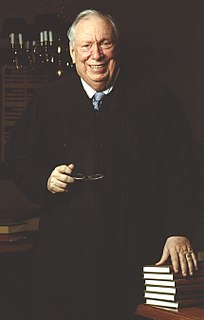A Quote by Antonin Scalia
The Court's decision reflects the philosophy that judges should endure whatever interpretive distortions it takes in order to correct a supposed flaw in the statutory machinery. That philosophy ignores the American people's decision to give Congress '[a]ll legislative Powers' enumerated in the Constitution. They made Congress, not this Court, responsible for both making laws and mending them.
Related Quotes
When the Founders thought of democracy, they saw democracy in the political sphere - a sphere strictly limited by the Constitution's well-defined and enumerated powers given the federal government. Substituting democratic decision making for what should be private decision making is nothing less than tyranny dressed up.
We want this - and I - we hope that right when they come back, that the Congress passes the Lilly Ledbetter Act which would correct the Supreme Court decision that was just recent that essentially guts wage discrimination law. It's been in place for years. It was gutted by this Roberts Court. We want it to be reversed by legislation. We hope that Congress passes it and that is on the desk for [Barack] Obama to sign as one of his first acts once he's sworn in. So it - I could go on, we have quite a well-developed list.
It would reduce the whole instrument to a single phrase, that of instituting a Congress with power to do whatever would be for the good of the United States; and as they would be the sole judges of the good or evil, it would be also a power to do whatever evil they please . . . . Certainly no such universal power was meant to be given them. It [the Constitution] was intended to lace them up straightly within the enumerated powers and those without which, as means, these powers could not be carried into effect.
More importantly, the Court forgets that ours is a government of laws and not of men. That means we are governed by the terms of our laws, not by the unenacted will of our lawmakers. 'If Congress enacted into law something different from what it intended, then it should amend the statute to conform to its intent.' In the meantime, this Court 'has no roving license ... to disregard clear language simply on the view that ... Congress 'must have intended' something broader.
A constitution, therefore, is to a government what the laws made afterwards by that government are to a court of judicature. The court of judicature does not make the laws, neither can it alter them; it only acts in conformity to the laws made: and the government is in like manner governed by the constitution.
I’ve chosen not to challenge the rule of law, because in our system there really is no intermediate step between a Supreme Court decision and violent revolution. When the Supreme Court makes a decision, no matter how strongly one disagrees with it, one faces a choice –are we, in John Adams’ phrase, a nation of laws, or is it a contest made on raw power?
The Constitution, in addition to delegating certain enumerated powers to Congress, places whole areas outside the reach of Congress' regulatory authority. The First Amendment, for example, is fittingly celebrated for preventing Congress from "prohibiting the free exercise" of religion or "abridging the freedom of speech." The Second Amendment similarly appears to contain an express limitation on the government's authority.
The case of Johnson v. M'Intosh is exactly why Congress can pass legislation as it did with the Rio Tinto land mine deal because Congress took the land from the tribes, ignores their sacred connections to it, their cultural connections and does whatever it wants with it. Congress terminated tribal status for more than 100 tribes. Basically said, you're not a tribe anymore and we're not going to pay attention to the treaties. The Supreme Court has held that when Congress breaches a treaty with an Indian tribe it's not judicially reviewable. It's called a political question.
I think this president has so badly abused his power, breached his trust in remarkable ways with our Congress, with the American people, has violated so many of our international treaty obligations, our Constitution, our domestic statutory laws, and has been responsible for ordering and condoning heinous human rights violations. We need to draw the line.
































